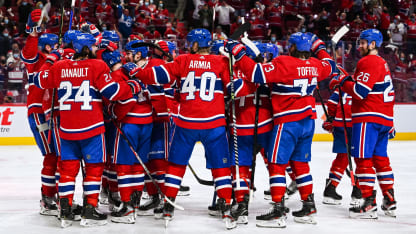An Ode to the 2021 Habs
Special contributor Marc Dumont reminisces on the Canadiens' run to the Stanley Cup Final and what it meant to Habs fans

© Icon Sportswire/Getty Images
When it comes down to it, that's what's left.
Moments.
Moments that will live on forever, shared by many, held close to their heart by those who chose to venerate at the altar of la Sainte-Flanelle.
Memories of tension, exhilaration, and frustration interjected with brief scenes of unbridled joy are sometimes hard to process, especially when you've been bombarded by a bevy of emotions brought on by the isolation and sadness endured over the last two years.
But that's the great thing about hockey, it has a funny way of allowing you to forget about the world for a while.
And that's exactly what we should cherish once we digest the defeat: the moments afforded to us by this beautiful sport.
The improbable run from Les Glorieuxmay not have ended perfectly, and give credit where it's due to the Tampa Bay Lightning for the win, but there was more to these playoffs than what went on inside the rink.
Joy returned to a city, a province, and well beyond.
Canadiens fans all around the world, many of them weary-eyed from waking up or staying up at all hours to watch their team put together a magical run, were permitted a little normalcy and happiness when they needed it most.
And for that alone, every single member of the Montreal Canadiens should hold their heads up high.
But there were fantastic moments on the ice, too.
When we give ourselves to appreciate the scenes, memories of Paul Byron's ridiculous knee-to-knee, shorthanded breakaway game-winning goal certainly come to the forefront.
On est sans mots.
— Canadiens Montréal (@CanadiensMTL) May 21, 2021
Speechless.#GoHabsGo pic.twitter.com/4ChH6PwrXM
While many goals energized the masses, Byron's incredible individual effort set the tone for the entire playoffs, as he was the first of many heroes that emerged at the perfect time to capture the imagination of fans who were told they should expect a quick postseason exit.
It was followed shortly by a goal that represented the most hopeful aspect of the playoff run: a glimpse into the future.
LE BUT GAGNANT EN PROLONGATION.
— Canadiens Montréal (@CanadiensMTL) May 28, 2021
THE OT WINNER.#GoHabsGo pic.twitter.com/9g9lMeWZGX
Though you could argue that for Nick Suzuki and Cole Caufield, the future is now.
Their 2-on-0 overtime goal in Game 5 against the Leafs wasn't just crucial, it was also a reminder that the best is yet to come in many cases.
At just 21 years old, Suzuki has already participated in 32 playoff games, which is an impressive number on its own, made even more impressive by the fact that he scored 11 goals and 13 assists in those games -- games that are designed to offer little to no space for offensive players such as Suzuki, who has led the Canadiens in playoff scoring in both years he's been in the League.
He doesn't just respond to pressure, he thrives in it, owing to his elite talent and exceptional intelligence.
Which brings us rather conveniently to the other player involved in that overtime goal. Prior to the start of the NCAA season, I asked Caulfield how he was going to deal with the pressure of eventually playing in a market like Montreal.
"Pressure is a privilege," he immediately said with a wry smile.
At just 20 years old, Caufield is coming off one of the most impressive seasons in prospect history. On top of his comically long list of accomplishments at the NCAA level, including capturing the Hobey Baker Award as the top player in college hockey, he finished the year with a World Junior Championship gold medal, a very successful stint in the AHL with the Laval Rocket, and an even more successful audition with the Canadiens, culminating with the invaluable experience that comes with being part of a team that beat all the odds to make it to the Stanley Cup Final.
COLE. CAUFIELD.
— Canadiens Montréal (@CanadiensMTL) June 25, 2021
Malade.#GoHabsGo pic.twitter.com/PhAvobjbCb
Caufield, the player so many doubted due to his size, stood taller than most, unyielding to the pressure he faced as the second-youngest player involved in the chase for Lord Stanley.
Jesperi Kotkaniemi, the third-youngest player in the playoffs, played a significant role in the Canadiens' success as well, not just by scoring a great overtime goal in Game 6 at home against the Leafs, setting the table for an epic comeback win in the first round, but also by contributing five even-strength goals, the most among all Canadiens forwards. Much like Suzuki, Kotkaniemi has been afforded a wealth of playoff experience at an incredibly young age and that experience will goa long way once he hits his statistical prime in a few years.
ON EST ENCORE EN TRAIN DE CRIER!!!
— Canadiens Montréal (@CanadiensMTL) May 30, 2021
THE OT WINNER AND WE'RE STILL SCREAMING!!!#GoHabsGo pic.twitter.com/1K3Z9NWPPZ
Alexander Romanov, another player who is still many seasons away from his prime, showed us a glimpse of what made Canadiens scouts smile when they saw he was available in the second round of the 2018 Draft. His raw energy should feature as a staple of the Canadiens blue line for several years to come.
Think of it this way: neither Romanov, nor Kotkaniemi, nor Caufield were old enough to gamble during their visit to Las Vegas in the Semifinals. They are, however, among the few who can proudly say they possess first-hand knowledge that the house doesn'talways win.
Yes, the youth movement is alive and well, soon to be bolstered by the 11 picks the Canadiens own in the upcoming NHL Draft, in addition to the 29 players they selected over the course of the last three offseasons. Not every pick will become an NHL player, but once in a while, you find a diamond in the rough. Case in point: Jake Evans.
But as we all know, the 2021 Canadiens were more than just a plucky bunch of talented youngsters.
They received contributions from every player on the roster.
Like Tyler Toffoli, who emerged as a fan favorite well before the overtime goal that eliminated the Winnipeg Jets in four-straight games and sent the town into a frenzy.
TOFFOLI MET FIN À LA SÉRIE!!!!!!
— Canadiens Montréal (@CanadiensMTL) June 8, 2021
TOFFOLI ENDS THE SERIES!!!!!!#GoHabsGo pic.twitter.com/45qjEU0zmI
Josh Anderson certainly made his mark, embodying the perfect power forward combination of speed, physicality, and goal-scoring prowess that so many general managers desperately search for.
Brendan Gallagher, who offered his blood, sweat, and tears as a sacrifice to the hockey gods, may not have been perfectly healthy, but his leadership and heart inspired fans and teammates alike.
Jeff Petry, arguably the most underrated defenseman in the NHL, also managed to lead by example despite dealing with injury issues, a common theme among a team that sacrificed everything they could for each other, an idea captain Shea Weber embodied as he blocked shots with reckless abandon and punished opposing forwards whenever they found their way into the defensive zone, much like his blue line partner, Ben Chiarot.
Joel Edmunson was excellent, full stop. He wasn't just physical, he played a smart brand of hockey that made a significant positive impact on the Canadiens' results every single night.
Brett Kulak, Erik Gustafsson, and Jon Merrill, players who have been underestimated their entire careers, also played their part in what was probably the most underrated postseason D corps in recent history.
They weren't perfect. No defensive squad is. But they were among the best teams in the playoffs when it came to defending the rush for a reason; they were big, and mean, AND played a tight structure which forced opposing players to either dump the puck or attempt a contested zone entry. They made life hell on forwards not just by hitting them, but playing a frustratingly efficient brand of suffocating defense.
Corey Perry reminded us that while youth may fade, talent and intelligence lives on. I'm not quite sure how to describe it, but Perry had an uncanny way of making everyone around him stand still, playing what looked like a professional brand of shinny hockey, twisting and turning his way around defensemen with the greatest of ease. Perry and Eric Staal provided the type of depth scoring and veteran leadership GMs hope to acquire every season at the deadline, and they did it with aplomb. They were joined by Michael Frolik, Jake Allen, and Tomas Tatar, who remained consummate professionals despite not finding their way into the lineup in the final games.
L'HOMME DES GRANDES OCCASIONS.#GoHabsGo pic.twitter.com/h79GnjZ9cV
— Canadiens Montréal (@CanadiensMTL) June 6, 2021
Joel Armia, who provided endless wins in tightly-contested board battles, also scored crucial goals when the team needed it most -- his calling card since arriving in Montreal.
Phillip Danault, who will haunt the dreams of several NHL superstars as they recall every time he shut down a prime scoring chance, emerged as one of the best shut-down centers in the League.
And then there's Artturi Lehkonen, the oft-maligned forward who expended as much -- if not more -- energy than any other player in the League during these playoffs. Not only did he score the goal that will be entrenched in Canadiens' fans memories forever, he also showed everyone just what it takes to win in these tightly-contested games; a never-ending flow of hard work and effort, sprinkled with a little bit of belief.
🗣OLÉ OLÉ OLÉ OLÉÉÉÉÉÉ#GoHabsGo pic.twitter.com/itIYTHm66r
— Canadiens Montréal (@CanadiensMTL) June 25, 2021
Finally, what more can be said about Carey Price, who made so many highlight saves in this playoff run that you could package them all in a montage that could rival most career highlights?
Price would likely defer the praise to his teammates, and rightfully so, because that's what leaders do best, but there's no denying his importance to the organization.
Price is the foundation of hope, surrounded by a team full of players who accepted their roles without question and made every fan beam with the type of pure, unadulterated pride that hasn't been felt in many years.
CAREY! CAREY! CAREY!#GoHabsGo pic.twitter.com/AojwXQpKb6
— Canadiens Montréal (@CanadiensMTL) June 25, 2021
It was what we needed, and it happened when we needed it most.
The Canadiens did not manage to win their 25th Stanley Cup this summer, that much is true, but there was something more to this run than just the potential of adding another banner to the rafters.
This team provided fans with fleeting moments that combined into something special. They gave us something to cheer for and something to bring us together. They gave a city and a province a chance to heal and find its way back to life.
That's the power of sport. That's the power of moments.


















